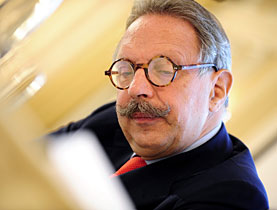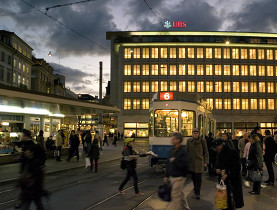Top banker defends Swiss finance centre

The chairman of the Swiss Bankers Association, Pierre Mirabaud, says that despite the worldwide financial crisis and its consequences, he remains confident.
Mirabaud admitted that 2008 had so far been an “annus horribilis” for the financial sector but countered that crises threw up opportunities, not just risks.
In particular, he honed in on Switzerland as a financial centre, noting that the country was not specifically associated with the crisis.
“I wonder when we will finally stop continually doing ourselves down,” he told a news conference in Zurich on Thursday, ahead of the annual meeting of top bankers in the capital, Bern.
“Confidence comes from the fact that the reputation abroad of Switzerland as a financial centre has remained very good. In that sense, I believe we have not suffered loss of confidence from foreign countries,” he told swissinfo.
“Switzerland also has a lot of trump cards. Our expertise in money management is intact. I don’t see any reason while there is a global financial crisis that this expertise might be in jeopardy.”
He said that unlike other countries, Switzerland had not been forced to spend public money on saving any banks because new and existing shareholders came up with the extra equity needed – a reference to Switzerland’s largest bank, UBS, which has been hit the hardest in Europe by the United States sub-prime mortgage crisis.
“Healthy”
“And last but not least, I’m proud of the many Swiss banks that were not directly affected by this crisis. The Swiss financial centre is healthy.”
Speaking about the lessons to be learnt from the present global financial turbulences, Mirabaud said it was “vitally important” for the Swiss financial centre to have a well-capitalised, crisis-resistant banking system.
This was particularly true given the “crucial role” played by the two major banks – UBS and Credit Suisse.
He explained that people had to become realistic again.
“A lot of good basic sense was lost in the euphoria of the beginning of this century and not only in Switzerland. In all the financial system there was an extreme incentive for short-term results, and people forgot about long-term developments.”
However, he said that the number one opportunity presented by a crisis was for the strongest market players to become even stronger as a result.
And the second lesson was for financial managers to realise they had to look at a long-term business model rather than a short-term one.
Banking secrecy
Mirabaud also turned the spotlight on banking secrecy, in particular revelations in February that Germany had acquired knowledge of German tax evaders with bank accounts in Liechtenstein.
Without citing names, he said: “it became very evident to one of the world’s tiniest countries that its large neighbour wanted to assert its interests using constitutionally extremely dubious methods”.
“Naturally enough, scarcely a day had passed before the spotlight also fell on Switzerland and its legal system.”
Mirabaud said he was “concerned” with the crucial question of how much privacy citizens could expect from their state.
He pointed out that Swiss law made a deliberate distinction between tax evasion – not a criminal offence in Switzerland – and tax fraud “and by the way it did this long before the European Union came into being”.
He argued that protecting privacy was quite simply a basic human need.
“Let us remind all our foreign critics once more: the electorate decides the future of banking secrecy in our country, not functionaries in Brussels, senators in Washington or OECD bureaucrats in Paris.”
swissinfo, Robert Brookes in Zurich
On the current financial crisis: “Mistakes were made for which we are all paying heavily – that is the bald truth. What disturbs me most is the way sane intellect was overtaken by a herd mentality, which is something the Swiss population cannot understand to this day.”
“Greed, egotism and thoughtlessness have been pushing aside moderation, the common good and consideration.”
“If the economy is doing well, it is thanks to others. But if it’s doing badly, only the banks are to blame.”
On privacy: “I would like to continue living in a country where – to loosely paraphrase Winston Churchill – people can be sure that when the doorbell rings at six in the morning, it’s the milkman and not tax investigators accompanied by TV cameras.”
The chief executive of the Swiss Bankers Association, Urs Roth, argued for stamp duties on certain transactions involving shares, bonds and insurances to be abolished.
“The government reduced [in 2007] company financing, private investments and insurance premiums by more than SFr3 billion ($2.74 billion). That in itself is sufficient reason to describe stamp duty as neither harmless nor justified.”
Roth argued that none of the financial centres Switzerland competed with had a comparable tax. Stamp duty, he said, was unknown in New York, Singapore, Hong Kong, Abu Dhabi, Luxembourg and Ireland.

In compliance with the JTI standards
More: SWI swissinfo.ch certified by the Journalism Trust Initiative











You can find an overview of ongoing debates with our journalists here . Please join us!
If you want to start a conversation about a topic raised in this article or want to report factual errors, email us at english@swissinfo.ch.